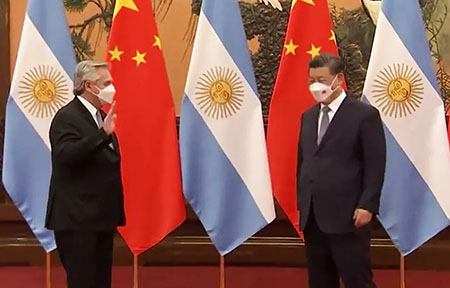Special to WorldTribune.com
For nearly a decade now, China’s “Belt and Road” commercial infrastructure initiative (BRI) has been expanding globally.
Usually, and most notably, countries which sign up are poor or unduly dependent on Beijing’s largesse and bulging coffers. Places like Burma, Cambodia, Sri Lanka and Pakistan have willingly joined the dragon’s embrace. In Africa many states predictably signed on; Djibouti, Kenya, Ethiopia and Tanzania. But when the BRI initiative reached Greece and linked up with the port of Piraeus, people began to focus.

As the world waited apprehensively for Russian actions in Ukraine and watched the Beijing Winter Olympics unfold, an unlikely Latin American political player visited both Moscow and Beijing. Argentina’s peripatetic socialist President Alberto Fernandez landed in Moscow and lunched with Vladimir Putin to give thanks for Russia’s Sputnik vaccine distributions in Covid ravished Argentina. Offering pleasantries to Putin’s ears, Fernandez declared that Argentina has to “stop being dependent on the International Monetary Fund (IMF) and the United States.”
Then he flew to the storied Middle Kingdom. President Fernandez visited Beijing seeking gifts and commemorating the 50th anniversary of diplomatic relations between Beijing and Buenos Aires. The Argentine president dutifully kowtowed to Chairman Xi Jinping and enrolled the Argentine Republic in China’s Belt and Road initiative. With a theatrical sweep of the hand, Chairman Xi offered “billions and billions of dollars coming Argentina’s way, US$23.7 billion from BRI loans and investments alone plus the proposal to broaden the currency swap with Beijing (already around half of Central Bank reserves),” according to the respected Buenos Aires Times.
Since 2013, BRI has emerged as a singular if controversial commercial influence buying plan of China’s communist regime, coming through lavish development loans, promoting infrastructure projects, and “judgement free” political policies, yet often to the backdrop of staggering debt entrapment. BRI offers Beijing a unique geopolitical policy edge.
Fernandez gushed on social media, “I had a cordial, friendly and fruitful meeting with Xi Jinping, President of China,” after which “we agreed to incorporate Argentina into the Belt and the Silk Road.”
Beijing’s geo/commercial game plan is stunningly simple; encourage Chinese imports, direct investment and debt. Otherwise known as the Silk Road, BRI looks to match resource rich countries and strategic ports to China’s interlocking system of commerce and promoting interdependence and often political alignment with China.
Significantly in a joint statement, Argentina reiterated its support for the One China policy that forms the cornerstone of Beijing’s claim to democratic Taiwan. Equally, China voiced its support for Argentina’s claim to what the statement called “the Malvinas,” aka the sovereign British Falkland Islands. Later to the chagrin of London, a Chinese Foreign Ministry spokesperson reiterated Beijing’s position in no uncertain terms: “China firmly supports Argentina’s legitimate claim of sovereignty over the Malvinas Islands.”
Why is this so important? Already 18 other Latin American countries are in Beijing’s BRI. Argentina is a resource rich and bountiful land graced by natural beauty but sadly saddled by the enduing socialist legacy of Peronism which Fernandez proudly embraces. Argentina has amazing food production and raw materials which China views with envy.
Argentina’s enduring cult of Peronism dating from the 1950’s remains a toxic mix of political populism, profligate government spending, and high-octane nationalism, still maintaining an emotional grasp on at least half the population.
Nonetheless Argentina’s chronic economic mismanagement, inflation and currency free fall make the country ripe for Beijing’s blandishments. When we visited Argentina a few short years ago, there were 36 Pesos to one US$ Dollar; now there are 106 to 1$!
The People’s Republic of China already operates a huge satellite tracking and telemetry complex in Argentina’s southern Patagonia region. The station is on a direct line with Washington DC and it’s widely believed to be used for eavesdropping on American communications. The facility was set up during the presidency of leftist leader Christina Kirchner Fernandez (no relation to the current president) and was approved by a deeply divided Congress in 2015.
On a more earthly matter, China is intent on providing the Argentine Air Force with modern JF-17 jets to replace its phased out French Mirages. The Argentine Defense Ministry has budgeted nearly $650 million for new fighter jets and China wants to do the deal. At the same time Russia is recommending its supersonic multirole Mig-35 aircraft.
American ambivalence towards Latin America for over a decade is reaping dangerous unintended consequences as China fills the gap.
Before leaving China, Fernández told Xi that had he been an Argentine citizen, he “would be a Peronist.” Perhaps so…
John J. Metzler is a United Nations correspondent covering diplomatic and defense issues. He is the author of Divided Dynamism the Diplomacy of Separated Nations: Germany, Korea, China (2014). [See pre-2011 Archives]

 By
By